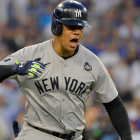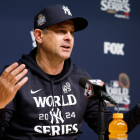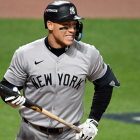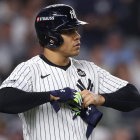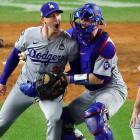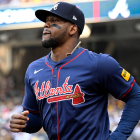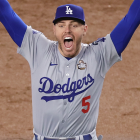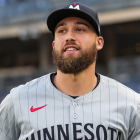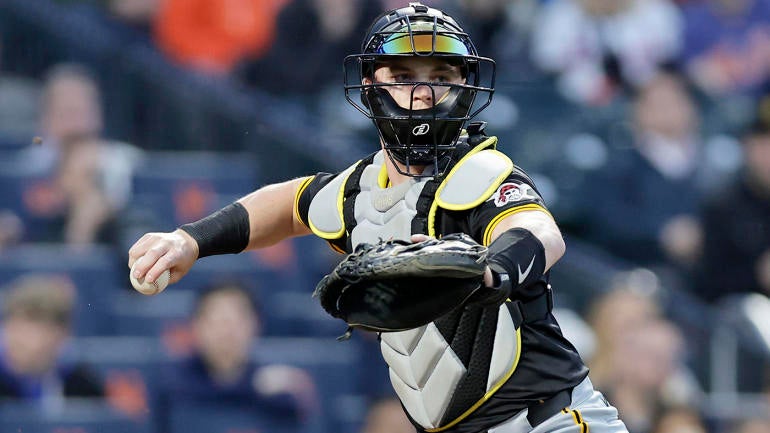
On Friday afternoon, the Pittsburgh Pirates demoted catcher Henry Davis to the minors to create space on the active roster for veteran backstop Yasmani Grandal. Davis, the No. 1 pick in the 2021 draft, hit just .162/.280/.206 (44 OPS+) over 23 contests. Those struggles, plus the ascent of Joey Bart, left the Pirates with little choice in the matter.
Davis, who turns 25 in September, has now failed to establish himself in the majors on separate occasions. Last year, he posted a 79 OPS+ across 62 games following a mid-June promotion. Whereas Davis primarily played right field in 2023, the Pirates tasked him with catching again after losing Endy Rodríguez for the year to offseason shoulder surgery. Alas, donning the tools of ignorance didn't enliven Davis' bat.
Anytime a recent No. 1 overall pick struggles like this at the big-league level, it's fair to wonder about both the past and the future -- does a team regret their selection, and is there still hope for a turnaround? With that in mind, here are four things worth knowing about Davis and his struggles, as well as Pittsburgh's draft regrets.
1. Davis was a reasonable, strategic No. 1 pick
Let's be clear: Davis was a defensible selection at the time based on his merits as a prospect. He was coming off a brilliant season at Louisville that saw him hit for power while making high amounts of contact and improving on defense. We here at CBS Sports ranked him as the fourth best player in the class that year, writing the following:
"Don't sleep on Davis as a dark horse to go in the top five," is how his preseason capsule began. Five months later, he's a legitimate candidate to go first overall, depending on his financial ask. Davis made the leap by hitting .370/.482/.663 this season with 15 home runs and seven more walks than strikeouts. The demand for two-way backstops always outpaces the supply, which is why Davis' upside is intriguing. He combines a low whiff rate with a high average exit velocity at the plate, and he's at least an adequate defender (with a strong arm) behind it. Some evaluators are concerned his strength-based swing won't work as well against advanced pitching. Fair enough, but he's the most accomplished collegiate bat in a class that doesn't have many of them, and it's hard to envision him slipping far beyond No. 5.
With that established, there was a strategic element to the Davis pick. He required just the fifth-highest signing bonus in the round, allowing the Pirates to dish out seven-figure bonuses to three other players: pitchers Bubba Chandler and Anthony Solometo and outfielder Lonnie White. To date, Chandler and Solometo remain two of the better prospects in Pittsburgh's system, while White has dealt with injuries.
Even if Davis doesn't work out as desired -- and more specifically on him in a few paragraphs -- the Pirates could walk with some solid players from that group.
2. Other top draftees have had issues, too
You might wonder: would the Pirates have been better off taking one of those aforementioned players who signed for more money?
Vanderbilt right-hander Jack Leiter (No. 2, Rangers) signed for the most money, at $7.92 million. Prep righty Jackson Jobe (No. 3, Tigers) came in second at $6.9 million, and prep shortstops Jordan Lawlar (No. 6, Diamondbacks) and Marcelo Mayer (No. 4, Red Sox) cleared the $6.6 million threshold. How have those players worked out?
Let's address them, in that order, in bullet point form:
- Leiter reached the majors for the first time earlier this season. He's struggled with consistency (of both his location and his secondary pitches) throughout his professional career. There's no reason for the Rangers to give up the ghost just yet on him developing into a starter, but we're far enough down the road now that it's worth contemplating if his future will come in a relief role.
- Jobe has overcome a rough introduction to pro ball to solidify himself as one of the better pitching prospects in the minors. He struck out 35% of the batters he faced through his first five starts this season at Double-A. Unfortunately, Jobe left his most recent start because of an apparent lower leg injury.
- Lawlar, like Davis, scuffled last year in his first big-league foray. He hasn't yet received a second try on account of a ruptured finger tendon that required surgery right before Opening Day. His defense should enable him to have a lengthy career, even if he never lives up to the Bobby Witt Jr. comparisons that were attached to him during his amateur days.
- We considered Mayer to be the best prospect in the class thanks to his instinctual defense and above-average left-handed stick. His stock has dipped since, but he could make his big-league debut later this year if he continues to hit.
It's probably safe to say that Jobe offers the most upside of the bunch at this stage. There are some tantalizing potential right-tail outcomes on the table for him if he can stay hearty and hale. Granted, he also offered the most downside risk given the attrition rates facing right-handed prepsters, and the Pirates would've been scrutinized for making that selection given the class's other top prospects.
As for Leiter, Lawlar, and Mayer -- they should still have big-league futures, albeit perhaps not as bright as we expected on draft night. Might the same be said of Davis?
3. Explaining Davis' struggles
We noted in the introduction that Davis' offensive output was horrific. It's not hard to understand why. Davis had either struck out or popped up in a combined 33 of his 83 trips to the plate, or 39.8%. You make what amounts to an automatic out in four out of every 10 plate appearances and you're going to find it difficult to put up numbers.
To Davis' credit, he continued to control the strike zone. To his debit, there was everything else. He whiffed on more than 35% of his swings, and when he connected his average exit velocity ranked in just the 17th percentile. That's simply not going to work for someone whose game is built around pulling the ball for damage.
The Pirates seem aware of that reality, too.
"The biggest thing is that, offensively, there's some adjustments that have to be made," manager Derek Shelton told reporters on Friday. "I think there's some adjustments that the major league game is going to show him that need to be made. It's one of those things with guys coming off (the injured list), it's a chance for Henry to catch his breath a little bit."
None of this means that Davis is cooked. Plenty of good players have begun their careers with a few hundred poor trips to the plate. Everyone forgets now, but Adley Rutschman was sporting a .684 OPS through his first 176 plate appearances; Bobby Witt Jr. was at .699 through 223; Kyle Tucker was at .633 through 228; and so on. Those are just three instances of good prospects who started slow before finding their way.
There's no guarantee Davis will follow suit -- plenty of players start poorly and never recover, too -- but you shouldn't rule out him making adjustments that work, either.
4. Part of a larger Pirates trend
Whatever you make of Davis, he could become part of a worrisome trend of premium picks wasted by the Pirates organization.
Since drafting Gerrit Cole as No. 1 overall back in 2011, the Pirates have made 21 first- or supplemental-round selections. Two of them have tallied more than five Wins Above Replacement: outfielder Austin Meadows (who did his best work with the Tampa Bay Rays) and third baseman Ke'Bryan Hayes.
For comparison's sake, the Los Angeles Dodgers have produced four first- or supplemental-round selections with five or more Wins Above Replacement during that span -- and they did it without picking higher than 18th. (Those players: Corey Seager, Walker Buehler, Will Smith, and Gavin Lux.)
It's fair to write that the Pirates need to draft much better if they're going to build a consistent winner. Owner Bob Nutting's self-imposed spending restrictions all but necessitate acing the draft -- especially the picks made in the early stages.
If there's good news for the Pirates, they should see their draft track record improve by default sooner rather than later. That's because Paul Skenes, the top pick in last summer's draft, should reach the majors over the coming weeks.










